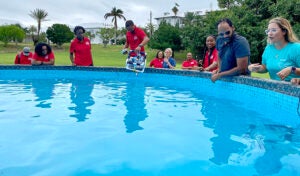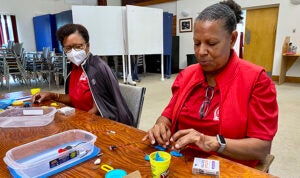Teachers Invited to “Dive In” to BIOS Education Programs

In coordination with the Bermuda Union of Teachers, BIOS held three half-day professional development workshops in October for primary and middle school teachers. The workshops were designed to introduce teachers to the field trip and virtual education opportunities currently being offered through BIOS’s Mid-Atlantic Robotics IN Education (MARINE) program. At the BIOS Innovation Pool, teachers learned how to pilot remotely operated vehicles (ROVs) and discussed ROV design and engineering concepts.
On October 24 and 25, BIOS introduced 42 primary and middle school teachers to a suite of education opportunities being offered through the Institute’s Mid-Atlantic Robotics IN Education (MARINE) program. The MARINE program workshops were coordinated through the annual Bermuda Union of Teachers conference, which includes professional development opportunities for teachers in the Bermuda Public School system during the fall half-term break.
“In addition to science, technology, engineering, and mathematics training, MARINE provides half-day field trips and virtual lessons that explore topics in robotics, physics, and computer science,” said Kaitlin Noyes, BIOS director of education and community engagement. “Thanks to the generous support of our donors, we have funding available to support up to two MARINE lessons per class during the 2022 to 2023 school year.” This funding covers the cost of transportation on the BIOS bus for in-person excursions at the Institute, experimental materials, and a BIOS educator.
The hands-on workshops were designed to introduce educators to the three MARINE programs and provide insight into how the lessons relate to Cambridge International Curriculum objectives, as well as ongoing research taking place at BIOS. The programs being offered for the current academic year include: “Diagrams and Conductors (Circuits),” “Simulations,” and “Robotics.”

During another workshop session, teachers were led through a circuit-building experiment included in MARINE’s “Diagrams and Conductors (Circuits)” program. This program, which covers physics objectives in the Cambridge International Curriculum for select primary and middle school classes, also provides participating students with the opportunity to test pilot ROVs at the BIOS Innovation Pool.
Each two-hour professional development workshop featured three rotating stations at which teachers could spent 30 minutes engaged in activities related to the programs, some of which include both field excursion and virtual options. Claire Fox, BIOS education officer, led teachers through a circuit building experiment linked to the “Diagrams and Conductors” program that was centered around testing conductors and insulators.
Chloé Baron, a Bermudian software developer, worked with teachers on a session supporting the “Simulations” program. She introduced participants to the concept of how digital prototypes can be utilized in computer simulations to help test and gather feedback for improving the design of underwater robots called remotely operated vehicles, or ROVs. Baron shared that ROVs are being used locally to help control the invasive lionfish population and led teachers through a computer-based ROV simulation focused on the crown-of-thorns starfish, whose population outbreaks can cause damage to Indo-Pacific reefs.
“The teachers dove right into the simulation and began proposing design solutions for their own ROVs,” Baron said. “Even though the simulation focused on a species not found in Bermuda, it was engaging and got them thinking about factors that need to be considered in ROV design, such as electrical current, storage capacity, and buoyancy. It was hard to pull them away from the computers at the end!”
Following the ROV simulation, teachers headed to the BIOS Innovation Pool to meet Kyla Smith, dive safety officer, and Kwe’Shon Woods-Hollis, small boats and docks supervisor. In a session that connected to both the “Circuits” and “Robotics” programs, Smith and Woods-Hollis showed teachers how to pilot ROVs to catch “lionfish.” Teachers also discussed the circuits used in the ROVs and brainstormed ideas for improving the robots’ overall design to be more efficient tools for culling lionfish.

Bermudian software developer Chloé Baron demonstrated how digital prototypes are used in computer simulations for ROV design testing and refinement, providing valuable feedback that can help improve the functionality of the robots in accomplishing specific tasks.
After attending the workshop, Denise Booth, a primary 6 (U.S. grade 5) teacher at West Pembroke Primary, booked her class for a “Circuits” program at BIOS on November 29th and 30th. Over the course of two days, her students will participate in the same sessions she tested during the professional development workshop in October.
“I knew immediately that BIOS was the place my students needed to visit to learn about circuits, as the hands-on activities are perfect for the P6 level,” Booth said. “I had an amazing time engaging with circuits and robotics. I didn’t know that ‘Play-Doh’ was a conductor of electricity!”
“The teachers enjoyed exploring novel ways to reinforce aspects of the physics curriculum that they deliver at school and I think they will be very involved when they bring their students to participate in these field trips at BIOS,” Fox said. “I found it really helpful to work not just with science teachers, but teachers of all subjects, as we had some great discussions about cross-curricular learning.”
